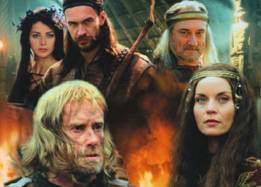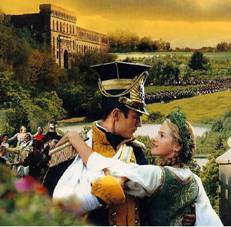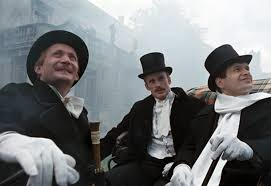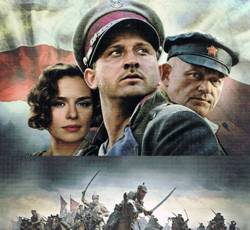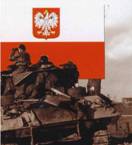‘When the Sun was a God / Stara Baśń’ dir. George Hoffman (2003).
This drama/fantasy tells the legendary story of King Popiel. It is set in Poland’s pagan times with fast action, explicit battles, romance and spectacular costumes. The fates of the characters interlace in an everlasting fight between good and evil and human passions of love, hatred and the greed for power.
The story focuses on Popiel, an evil and oppressive ruler who uses force unjustly on neighbouring people. The people unite and make an effort to overthrow him. Within the story are the Sun deity, a four faced statue worshiped by the Poles, and the Viking Odin, a second force portrayed as a very powerful group of warriors, who battle the pre-historic Poles.
The battle scenes are graphic and bloody with realistic special effects and sheer brutality.Of course, there is a love story complete with magical pagan rituals and dance. The movie contains eerie music and beautiful photographic imagery.
This feature film, based on an 1876 novel by Józef Ignacy Kraszewski, was released in the UK in 2011 under the title ‘Army of Valhalla’.
If you enjoy historical movies you have to watch this one..
Subtitles. Age 16+. 2-4.30 pm (135 min)
Museum entry by donation. Polish Museum, 125 Elliot St, Howick. Ph 533 3530
Pan Tadeusz or Mr Tadeusz, recounts the story of two feuding noble families and the love between Tadeusz Soplica (the title character) of one family, and Zosia of the other. Beautiful scenes and period costumes make this a must see…
The subplot involves a spontaneous revolt of the local inhabitants against the occupying Russian garrison.
The story takes place over the course of five days in 1811 and one day in 1812 at a point in Polish history, when Poland-Lithuanian Commonwealth had already been divided between Russia, Prussia, and Austria. The scene is set in the Lithuanian village of Soplicowo.
‘Promised Land / Ziemia obiecana’ dir. Andrzej Wajda (1975).
This historical drama is set during the late 19th century in Lódz, the cradle of the Polish textile industry, which seems to be a promising place for European migrants to Poland.
The film begins when three dispossessed but industrious men, a Pole, a Jew and a German set out to build their own factory. As one of them says, “I have nothing, you have nothing, he has nothing: this means we have enough to start a factory.”
But complicated relations in the world of manufacturers and a dangerous affair can destroy visionary plans.
‘Ziemia obiecana’ was the nickname of the city of Łódź , given by immigrants arriving in the industrial centre, searching for the prosperity promised by rapid modernization.
Viewers have commented that this film, made during the communist era, is also anti-capitalist.
Subtitles. Age 16+. Thursday Midweek (138 min)
Warsaw residents Ola and Jan experience one of the most important battles in world history. The Battle for Independence halted the Red Army’s march on Europe in the aftermath of WW1, forcing Lenin and Trotsky to resign from lighting the ‘flame of the world revolution’.
However, it is not the historical figures, apart from Pilsudski, who will play a decisive role in this film. The entire burden of action and the involvement of the audience’s emotions falls on the shoulders of the two literary characters: Ola, a revue theatre actress and her recently married husband Jan, a communist-supporting idealist. The fighting lines will be shown by Jan’s fate. Ola will be a participant and witness of the emotions experienced by the residents of Warsaw.
The 1920 Battle of Warsaw is the only battle fought and won by the Poles, unassisted by others, since the 17th century.
”Soviet Story’ is the most powerful antidote yet to the sanitation of the past.
This film is gripping, audacious and uncompromising.’ The Economist
This is a story of an Allied power, which helped the Nazis to fight Jews and which slaughtered its own people on an industrial scale.
Assisted by the West, this power triumphed on May 9th 1945. Its crimes were made taboo and the complete story of Europe’s most murderous regime has never been told till now.
Mature audience only.
This film is about the 1940 Katyn massacre directed by Andrzej Wajda.
It was nominated for the Best Foreign Language Film for the 80th Academy Awards.
In the movie the events of Katyn are related through the eyes of the women, the mother, wives and daughters of the victims executed on Stalin’s order by the NKVD in 1940.
The Polish museum is for all New Zealanders
“GLAM” Gallery, Library, Archive, Museum
Howick is a destination that offers variety including Howick beach, Stockade Hill, various Fencible sites and historical walks, All Saints Church, Uxbridge Creative Arts Centre, Te Tuhi Gallery and Howick Historical Village.
The quaint Howick village shops are a 5 minute walk from the museum and the Botany Town Centre is a 10 minute drive.
We look forward to welcoming you to “Polish films in Howick”, the Howick district and the Polish Museum.
In September 1939 Poland was overrun by the German and Russian, yet the Polish fighting spirit remained unbroken… They were displaced fighting forces, which would exact revenge for the occupation of Poland, fighting first in France, and than alongside with British in almost every campaign in the desert and Western Europe
After 7 years of fighting, many of those soldiers who returned home from the war were arrested , murdered or deported to Siberia by the Soviets who now occupied Poland.
The Free Polish forces will be remembered as the Gladiators who were willing to sacrifice everything to rescue their country.
This dramatised documentary recounts how, during the most decisive phase of Battle of Britain, a single squadron of 34 Polish fighter pilots wreaked havoc on the Luftwaffe, in the process helping to change the course of history and overturning RAF prejudices.
Based on a diary kept by the Pilots of the 303 Squadron.
Belatedly, the Poles were cleared for active service and had an immediate impact. By the time the Battle of Britain was won, they had claimed 126 enemy planes, but as the war ended, their joy turned to despair as they saw their own country handed to Stalin
Ron Jeffery was described by the Gestapo as “one of the foxiest devils in Europe” His wartime adventures as a courier, spy and even executioner have all the hallmarks of a fantastic spy thriller– but it’s all true.
This powerful film uses mix of documentary, rare archive footage and vivid recreations to lift the secrecy on this story of a courageous British born, New Zealander during his time in Europe during WW2
Ron Jeffery served as a Lance Corporal in the 6th West Kent Battalion and was captured during the Battle of France by the Wehrmacht in 1940. He was transported to prison and then to a camp in Poland. He escaped twice from two camps and finally joined up with the Polish Underground Army in Warsaw.
Using forged documents issued under false Polish and German names, Jeffery began to serve as a courier in the Polish Underground, as a part of several missions to occupied cities such as Vienna, Prague and Budapest.
After WW2, Jeffery emigrated to New Zealand where he ran a business.He compiled his memoirs in the book called “Red Runs the Vistula” published in 1985.
This is his story.
Awards:
In 1943, Home Army General Tadeusz Bor-Komorowski personally awarded Jeffery the Polish Cross of Valour.
In 1996 Jeffery was awarded the Home Army Cross
In 1995, the President of Poland Lech Walesa awarded him the Comander of the Order of Merit, one of the highest honours the Polish Government can bestow on a foreigner.
‘Battle of Warsaw – Uprising in 1944 / Bitwa o Warszawe – Powstanie w 44’ dir. Wanda Koscia (2005). History of the Warsaw Uprising, the bloodiest military action taken by the only underground army in occupied Europe.
The history of the 1944 Warsaw Uprising presented from the perspective of participants, mainly insurgents who in a lively, involved and emotional way talk about their experiences, fate of their friends and their beloved city. The story is also told from 2 other perspectives, a German soldier, who participated in the brutal suppression of the Warsaw’s quarter Wola and a British pilot and member of the British Military Mission in Moscow.
Their accounts allow their views to reconstruct a dramatic story of the uprising and the personal dramas of its participants.Produced in Poland and Great Britain. (47 min)
PLUS
‘A Forgotten Odyssey’ dir. Jagna Wright (2000). In 1940, after Russia invaded Poland, Stalin deported 1.7 million Poles to slave labour camps in Siberia and Kazakhstan. Only one third of them survived.
They tell their stories. The main destinations of these transports were Archangelsk and Kazakhstan. In some cases, the deportees were just dumped in the middle of a forest and told to build their own shelters. In other cases, they were moved to various collective farms called “kolhozs” (collectivnoye hoziaystvo).
It is estimated that slightly more than 100,000 people were later transported to Pahlevi, Persia, via the Caspian Sea. Roughly half were soldiers and half civilians. This constitutes about 7 percent of all Polish citizens who were in Russia between September 1939 and June 1941.
How many remained in Russia, how many died, how many were allowed to return to Poland after the war can be only speculated. (52 min)
In 1976, a young woman, Agnieszka is making her diploma film, looking behind the scenes at the life of Birkut, at how that heroism was created, and what became of him. She gets hold of out takes and censored footage and interviews the man’s friends, ex-wife, and the filmmaker who made him a hero.
The film chronicles the fall from grace of a fictional heroic Polish bricklayer, Mateusz Birkut, who became the symbol of an over-achieving worker in Nowa Huta, a new socialist city created in the 1950’s near Krakow. Dozens of men were lined up in the mud in a food line. There are no women to be seen. The men are housed in barracks. When presented with a single fish on a plate for lunch, they begin spontaneously to pelt the Party Official with the fish and succeed in driving him out. Birkut is one of these workers…
It is a surprise that Wajda would have been able to make such a film, revealing the use of propaganda and political corruption during the period of Stalinism.
